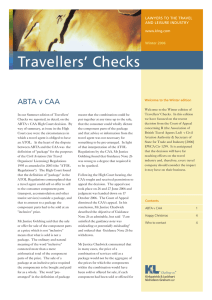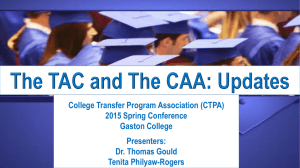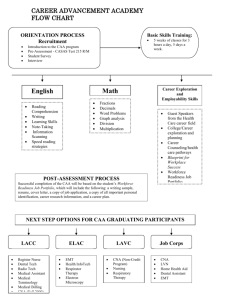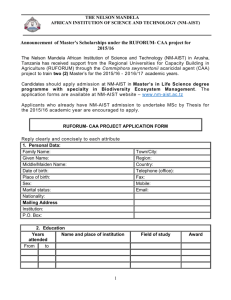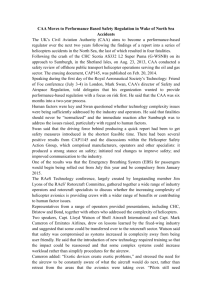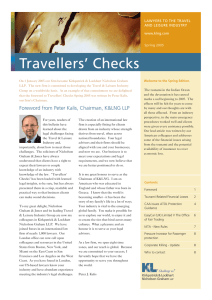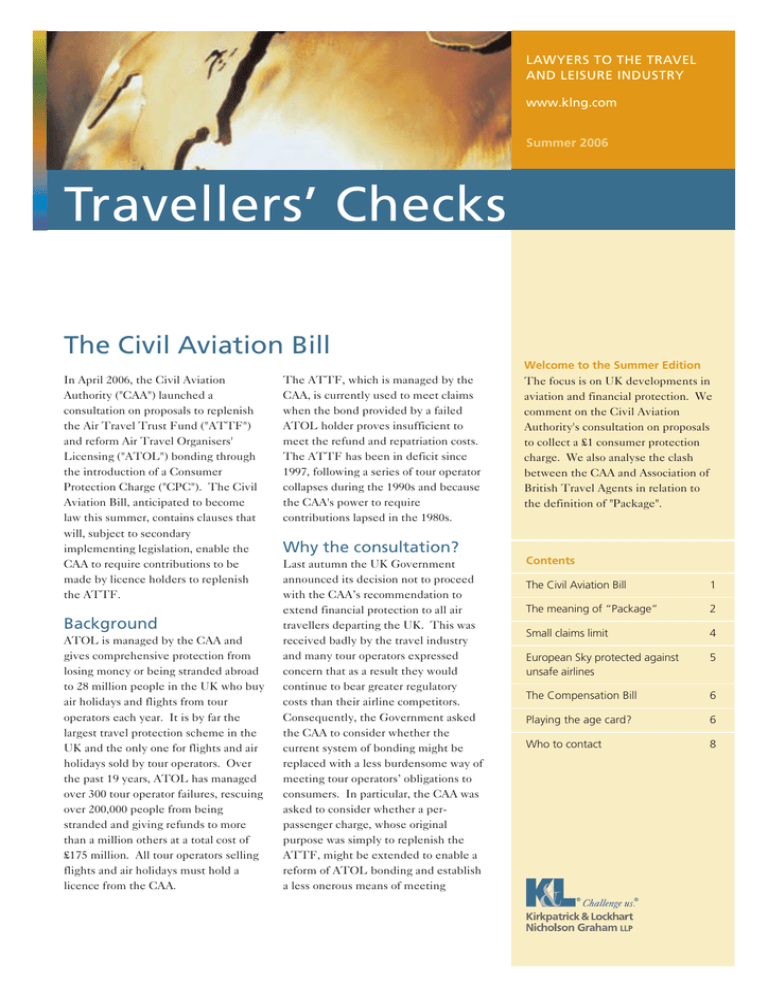
LAWYERS TO THE TRAVEL
AND LEISURE INDUSTRY
www.klng.com
Summer 2006
Travellers’ Checks
The Civil Aviation Bill
In April 2006, the Civil Aviation
Authority ("CAA") launched a
consultation on proposals to replenish
the Air Travel Trust Fund ("ATTF")
and reform Air Travel Organisers'
Licensing ("ATOL") bonding through
the introduction of a Consumer
Protection Charge ("CPC"). The Civil
Aviation Bill, anticipated to become
law this summer, contains clauses that
will, subject to secondary
implementing legislation, enable the
CAA to require contributions to be
made by licence holders to replenish
the ATTF.
Background
ATOL is managed by the CAA and
gives comprehensive protection from
losing money or being stranded abroad
to 28 million people in the UK who buy
air holidays and flights from tour
operators each year. It is by far the
largest travel protection scheme in the
UK and the only one for flights and air
holidays sold by tour operators. Over
the past 19 years, ATOL has managed
over 300 tour operator failures, rescuing
over 200,000 people from being
stranded and giving refunds to more
than a million others at a total cost of
£175 million. All tour operators selling
flights and air holidays must hold a
licence from the CAA.
The ATTF, which is managed by the
CAA, is currently used to meet claims
when the bond provided by a failed
ATOL holder proves insufficient to
meet the refund and repatriation costs.
The ATTF has been in deficit since
1997, following a series of tour operator
collapses during the 1990s and because
the CAA's power to require
contributions lapsed in the 1980s.
Welcome to the Summer Edition
The focus is on UK developments in
aviation and financial protection. We
comment on the Civil Aviation
Authority's consultation on proposals
to collect a £1 consumer protection
charge. We also analyse the clash
between the CAA and Association of
British Travel Agents in relation to
the definition of "Package".
Why the consultation?
Last autumn the UK Government
announced its decision not to proceed
with the CAA’s recommendation to
extend financial protection to all air
travellers departing the UK. This was
received badly by the travel industry
and many tour operators expressed
concern that as a result they would
continue to bear greater regulatory
costs than their airline competitors.
Consequently, the Government asked
the CAA to consider whether the
current system of bonding might be
replaced with a less burdensome way of
meeting tour operators’ obligations to
consumers. In particular, the CAA was
asked to consider whether a perpassenger charge, whose original
purpose was simply to replenish the
ATTF, might be extended to enable a
reform of ATOL bonding and establish
a less onerous means of meeting
Contents
The Civil Aviation Bill
1
The meaning of “Package”
2
Small claims limit
4
European Sky protected against
unsafe airlines
5
The Compensation Bill
6
Playing the age card?
6
Who to contact
8
Travellers’ Checks
licence holders' financial protection
obligations to air travellers. Terms of
Reference for this work were agreed
between the CAA and Government last
November.
The CAA sets out in the consultation
document its views on the potential
reduction in regulatory burden that
would arise from a reform of bonding.
It also outlines the principal issues
associated with such a reform and its
preliminary views on how these might
be tackled. The emphasis of the
consultation is on simplification: the
current system based around bonds is
complex and the CAA considers that a
reform of bonding will bring significant
de-regulatory benefits to tour operators.
Proposed changes
The ATTF is currently in deficit by
£15.5m and is incurring annual interest
costs of more than £0.7m. Licence
holder failure costs have, therefore,
been met through a borrowing facility
guaranteed by Government. The CAA
thinks that a CPC to replenish the
ATTF needs to be introduced as a
priority to place it on a firmer footing,
irrespective of whether or not bonding
is reformed through a CPC on
passengers.
The CAA proposes in its consultation
that ATOL holders would collect a £1
CPC from each passenger when they
book and that the funds collected
would be used to build up a fund of up
to £250m to enable bonding to be
removed. The CAA's view is that the
contribution should be set at as low a
level as possible, given the continuing
market distortion that leads to licence
holders bearing greater regulatory costs
than their airline competitors.
A transparent £1 CPC would replace
the hidden bonding charge which the
consumer currently pays. At the same
time the consumer would continue to
receive the same level of financial
protection that ATOL currently
provides. The CAA proposes that a
CPC would be introduced for all
bookings taken after 30 September
2007 and bonds would no longer be
required as a licence condition after
that date.
Once the CAA has reviewed responses
to the consultation paper, there will be
a second formal three month
consultation, with a Regulatory Impact
Assessment, on draft legislation
dependent on the outcome of this
initial phase.
The meaning of “Package”
On 16 January 2006 in the case of R
(the Association of British Travel
Agents Ltd) v Civil Aviation Authority
& Secretary of State for Trade and
Industry [2006] EWHC 13 (Admin),
the High Court held that the Civil
Aviation Authority's ("CAA") guidance
note on the Air Travel Organiser's
Licence ("ATOL") regulations
("Guidance Note 26") should be
quashed. At issue in this application
for judicial review were the
circumstances in which a travel agent is
obliged to have an ATOL. At the heart
of the dispute between ABTA and the
CAA was the definition of "package"
for the purposes of the Civil Aviation
(Air Travel Organisers' Licensing)
Regulations 1995 as amended in 2003
(the "ATOL Regulations"). ABTA
challenged the CAA's view in that
2
SUMMER 2006
regard contained in its Guidance Note
26 which set out how the CAA
intended to interpret and enforce
(including by possible criminal
sanction) the ATOL Regulations.
Background to the claim
The CAA was constituted by the Civil
Aviation Act 1971 and the provisions
relating to it were consolidated in the
Civil Aviation Act 1982 ("the Act").
The Act provides that a function of the
CAA is "the licensing of the provision
of accommodation in aircraft". The Act
stipulates that anyone who makes
available, as principal or agent,
accommodation for the carriage of
persons on flights or holds himself out
as such a person, must hold and comply
with the terms of a licence issued in
pursuance of the regulations. The
ATOL is such a licence.
The ATOL Regulations were made
under the Act. In 2003 they were
amended in order to prevent the
practice of "contract splitting" which
the CAA became concerned about in
the late 1990s. "Contract splitting"
refers to the practice by some firms not
holding an ATOL of advertising flights
and hotel accommodation as a package
and then deliberately selling the
component parts under separate
contracts in order to avoid the
requirement of holding a licence. The
consumer would, in fact, be buying a
package holiday. However, to evade
the requirement to have an ATOL as
the supplier of air accommodation, the
travel agent would artificially separate
component parts of the package and
www.klng.com
package holidays and package tours
1990 (the "Directive"), the PTR and
the ATOL Regulations. Guidance
Note 26 sought to set out the meaning
of the words "package", "pre-arranged"
and "inclusive price". Under the
heading "package" the Guidance stated
that:
"One reasonable test is to consider what
the consumer thinks he is getting when
he approached the agent or travel
organiser; artificial arrangements to sell
components at separate times with
separate billing would not mean that a
package had not been sold".
Under the heading "inclusive price",
the Guidance stated:
present what was in truth one contract
between the consumer and the travel
agent as two separate sales; the sale of
an airline ticket on behalf of an ATOL
registered supplier of air
accommodation and the discrete sale of
hotel accommodation. The effect of
this being that whilst the flight
accommodation would be governed by
an ATOL because it was sold as agent
for an ATOL holder, the other services
would not because they were being
sold separately.
The ATOL Regulations were,
therefore, amended to deal with the
situation where the substance of the
transaction was the single sale of a
package holiday and the appearance
was of two or more distinct transactions
between the consumer and the travel
agent. As part of the amendment, the
ATOL Regulations incorporated a
definition of package identical to that
contained in the Package Travel,
Package Holidays and Package Tours
Regulations 1992 ("PTR"). Paragraph
1(2) of the ATOL Regulations defines
package as follows:
“"Package" means the pre-arranged
combination of at least two of the
following components when sold or
offered for sale at an inclusive price and
when the service covers a period of
more than twenty-four hours or
includes overnight accommodation:
(a) transport;
(b) accommodation;
(c) other tourist services not ancillary to
transport or accommodation and
accounting for a significant proportion
of the package, and (i) the submission
of separate accounts for different
components shall not cause the
arrangements to be other than a
package; (ii) the fact that a combination
is arranged at the request of the
consumer and in accordance with his
specific instructions…. shall not of
itself cause it to be treated as other
than pre-arranged”.
Guidance Note 26
The CAA produced Guidance Note 26
to help travel organisers and agents
understand the definition of an air
package set out in the European
Council Directive on package travel,
"It does not matter if the cost of a
package is made up of separate sums
relating to the value of each element
(travel, accommodation, other ancillary
tourist services). In these
circumstances, the whole arrangement
can still be sold at an inclusive price".
Guidance Note 26 also set out the basis
on which the CAA would monitor
compliance with the ATOL
Regulations and prosecute travel agents
if necessary for failure to comply.
ABTA submitted that the guidance was
plainly wrong and did not accurately
reflect the ATOL Regulations. ABTA
stated that its understanding of the
effect of the 2003 amendments was to
prevent the unbundling of what is in
truth a package: in other words to
prevent a contract with the consumer
being split. It was not to prevent the
travel agent providing the consumer at
the same time with different travel
services if they are provided outside a
package. ABTA commented on the
potential impact of Guidance Note 26
on the travel industry, highlighting the
SUMMER 2006
3
Travellers’ Checks
financial effect on small businesses
who would be required to have an
ATOL in addition to the bonding they
provide through ABTA.
Decision
Mr Justice Goldring found that the
definition of "package" in the ATOL
Regulations contemplated that a travel
agent could sell or offer to sell to the
consumer component parts (transport,
accommodation and other tourist
services) outside a package and that to
amount to a package the component
parts had to be sold at an "inclusive"
price. He said that the sale or offer for
sale of the component parts at a price
which is not "inclusive" means that
what is sold is not a package. The
ordinary and natural meaning of the
word "inclusive" connoted more than a
mere arithmetical total of the
component parts of the price. The sale
of a package at an inclusive price
required the components to be bought
and paid for as a whole. The word
"pre-arranged" in the definition of
package meant that the combination
could be put together at any time up to
the sale, that the consumer could
wholly dictate the component parts of
the package and that advice or
information from the travel agent was
not necessary for something to be prearranged. In light of that interpretation
of the ATOL Regulations by the CAA,
Mr Justice Goldring found that
Guidance Note 26 was wrong to a
degree that required it to be quashed.
What next?
There have been substantial changes to
the travel industry in recent years,
principally as a result of the availability
of cheap flights direct from airlines and
the ease with which flights and
accommodation can be bought over the
internet. This has lead to an increasing
tendency for people to buy separate
holiday components rather than prearranged packages and these sales, at
present, fall outside both the ATOL
Regulations (and their primary
enabling legislation) and the Directive.
They therefore, carry no statutory
protection against the insolvency of any
of the suppliers. Indeed, it would seem
that neither the ATOL Regulations nor
the PTR now provide protection for
the substantial majority of holidays and
leisure travel that was envisaged. As
Mr Justice Goldring concluded:
"The Directive and the legislation
following it were, as the CAA has in the
past stated, based upon a concept of a
"package" which is now to a significant
extent out of date. The use of the
words "inclusive price" reflected that
old concept of a package. It may be, as
the CAA has said, that fresh legislation
is needed to cover the current way in
which flights are sold".
The CAA has sought and received,
permission to appeal this decision.
The appeal is expected to take place in
June and it is anticipated that there will
be a judgment before the ATOL
September renewal. If the judgment is
upheld, it is likely to trigger
widespread changes. Thomas Cook
has indicated that it will reorganise the
way in which it sells holidays and travel
services and within two years will no
longer hold an ATOL. It is thought
that other tour operators may follow
suit.
Small claims limit
The Government’s Better Regulation
Taskforce has advised Government to
consider raising the small claims limit
in personal injury claims from £1000 to
£5000. The Department of
Constitutional Affairs House of
Commons Select Committee also
recommended recently that the limit
should be raised to £2500.
The small claims track ensures access
to justice by allowing small,
straightforward claims to follow a
simpler process without incurring
significant costs liability. The advice
4
SUMMER 2006
Government has received assumes that
claims under £2500 / £5000 are simpler,
so people can handle them without
expert advice. This is true in many
cases, but not in personal injury claims.
According to the Law Society, raising
the limit to £2500, will encompass the
majority of personal injury claims.
They consider that this will have a
significant negative impact, from a
costs perspective, on those defending
this type of claim and restrict their
access to justice.
www.klng.com
European Sky protected against unsafe airlines
The safety of air transport has been a
top priority for the European
Community ever since the introduction
of a common air transport policy.
Regulation 2111/2005 EC, which came
into force in January 2006, is a further
step towards enhancing European air
safety and passenger protection by
allowing the European Commission to
ban or restrict the activities of unsafe
airlines within the European Union.
On 22 March 2006, the European
Commission adopted the first EU list of
airlines banned in the European Union.
These airlines are considered to be
unsafe and are therefore not permitted
to fly passengers or cargo in the EU or
operate within European airspace. The
objective is to ensure that all airlines
operating in Europe's sky meet the
highest safety standards. In addition to
the list, the Commission will also advise
people to avoid travelling with these
airlines in other parts of the world.
The black list has been compiled on the
basis of national contributions and after
an in-depth analysis with Member State
experts. Since 16 January 2006, when
Regulation 2111/2005 EC came into
force, Member States have informed
the European Commission of any flight
bans or operating restrictions in their
territory and of the reasons for such
bans. Bans and operational restrictions
are only imposed based on evidence of
violation of objective and transparent
criteria which are published in
Regulation 2111/2005. These criteria
focus on the results of checks carried
out in European airports; the use of
poorly maintained, antiquated or
obsolete aircraft; the inability of the
airlines to rectify shortcomings
identified during inspections; and the
inability of the authority responsible for
overseeing an airline to perform its task
properly. The list will be updated as
often as is necessary and at least every
three months.
If an airline feels that it should be taken
off the list because it again complies
with safety standards, it should contact
the Commission or a Member State.
The Committee of Aviation Safety
experts will assess the evidence
provided by the airline or its supervisory
authority. The Commission will take
its final decision based on the
Committee’s opinion. The same
procedure applies if an airline should be
added to the list. Herein, the
Commission can act at the request of a
Member State or on its own initiative, a
right which it did not have for drawing
up the first list which is based
exclusively on national contributions.
The Commission will act upon
information gathered by its own
services, the European Aviation Safety
Agency (EASA), Member States or the
International Civil Aviation
Organisation.
The European Commission believe
that the black list will have a real impact
on aviation safety in the European
Union. In addition to its punitive
effect, the black list will encourage all
airlines operating in Europe to comply
fully with safety standards and will
dissuade unscrupulous airlines from
starting up services in Europe. It will
avoid discrepancies between national
flight bans and restrictions. The
European Commission also thinks that
through its wide publication, the list
will have an impact world-wide.
SUMMER 2006
5
Travellers’ Checks
Compensation
Bill
The Compensation Bill was introduced
to the House of Lords on 2 November
2005. It provides a framework for the
regulation of claims management
services and contains a provision on the
law of negligence to make clear that
the social value of activities is a factor
which the court can take into account
in considering a claim. The Bill forms
part of a wider programme of work
which the Government is taking
forward to tackle perceptions that can
lead to a disproportionate fear of
litigation and risk averse behaviour;
find ways to discourage and resist bad
claims; and improve the system for
those with a valid claim.
The Bill will allow for the Secretary of
State to designate a regulator who will
be responsible for ensuring that claims
management companies abide by clear
rules and a code of practice. A person
providing claims management services
without the requisite authorisation (or
if exempted or subject to a waiver) will
be committing an offence and liable to
a maximum of up to 2 years
imprisonment. Those providing claims
management services will be required
to give consumers clear advice about
the validity of their claim, options for
funding the costs and provide a
complaints mechanism if things go
wrong. The Bill is still in draft form
and it is anticipated that it will have a
second reading by the House of
Commons at some stage in June.
6
SUMMER 2006
Playing the age card?
From 1 October 2006 discrimination on
the basis of age will be unlawful in the
UK. The Age Equality Regulations
2006 (the "Regulations") were published
on 9 March and will impact on all aspects
of the employment relationship. This
will affect employers in all industries but
is particularly likely to affect the Travel
and Leisure industry which traditionally
relies on a younger workforce.
What are the key changes that will take
place on 1 October 2006?
n
Prohibition of unjustified age
discrimination in employment. This
covers all aspects of employment,
including recruitment, promotion,
training and retirement. It will be
unlawful to treat employees less
favourably, directly or indirectly, on
the basis of their age unless such
treatment can be objectively
justified.
n
There will be a national default
retirement age of 65, which the
Government has committed to
review in 2011. Employers who set a
retirement age below the default age
of 65 will be required to justify or
change it.
n
Employees will have the right to
request the ability to work beyond
retirement age and there is a new
duty on employers to consider an
The current legal position
At present, employers can dismiss
employees with relative impunity at the
employer's normal retirement age
("NRA") and there has been no
prohibition on discrimination on the
grounds of age. Employees generally
have no legal recourse against
compulsory retirement. Age
discrimination is not unlawful and
employees are ordinarily barred from
claiming unfair dismissal or redundancy
rights after they reach the NRA or, in the
absence of a NRA, 65.
www.klng.com
employee's request. Employers will
have to inform employees at least 6
months in advance of their intended
retirement date of this right.
n
The upper age limit for unfair
dismissal and redundancy rights will
be removed, giving older workers the
same rights to claim unfair dismissal
or receive a redundancy payment as
younger workers, unless there is a
genuine retirement.
n
It will be unlawful to harass or
victimise an employee on the basis
of their age.
n
Younger employees will also be
protected from age discrimination.
By contrast in the US only workers
aged 40 and above are protected.
Under limited circumstances age
discrimination may be lawful. For
instance, where there is an objective
justification for treating people
differently (which will require
employers to show that the treatment
in question is pursuing a legitimate aim
and is a proportionate means of doing
so) or where the discrimination is
covered by one of the exemptions in
the Regulations (such as pay related to
the National Minimum Wage or certain
service related benefits). It is also
permitted where there is a genuine
occupational requirement that a person
be of a certain age (for example, a play
which has parts for older and younger
characters) and there is a specific
exemption that permits employers to
refuse to recruit a person where that
person is older than, or within six
months of, the employer's NRA.
The Regulations are likely to affect the
Travel and Leisure industry in the
following ways:
Employers who market, for instance,
holidays for 18 to 30 year olds would
traditionally employ holiday
representatives of a similar age.
However, from 1 October such
employers will need to think carefully
about their recruitment, training and
promotion system. For instance, an
advertisement placed only in a
magazine aimed at young people may
indirectly discriminate against older
people because they are less likely to
subscribe to the magazine and
therefore, less likely to find out about
the vacancy and apply. Employers will
need to avoid using language that may
imply that they would prefer someone
of a certain age, such as "energetic",
"young", "experienced" and "mature".
Hidden messages present in
recruitment literature, such as, a
photograph of a young representative
taking holiday makers on a pub crawl
around bars in Ibiza, should be avoided
wherever possible. This scenario could
also be viewed in reverse, whereby a
travel company providing holidays for
the retired may be marketing itself
indirectly to older employees.
Another example of indirect age
discrimination could be where a job as
a coach driver or holiday representative
is advertised as having a minimum
requirement of 10 years driving
experience. This would effectively
prevent people under 28 from applying
for the job unless this 10 year criterion
could be justified, bearing in mind that
only 4 years experience is required to
qualify as a driving instructor.
All employers will need to ensure that
there are no policies or practices in
place that indirectly (or directly)
discriminate against employees of
certain age groups. For example, an
older employee in the travel industry
may find it harder than a younger
employee to be travelling abroad all the
time due to family commitments or
health problems. Employers will have
to ensure that such employees are not
indirectly discriminated against as a
consequence.
SUMMER 2006
7
Travellers’
Checks
Travellers’ Checks
Conclusions
The extension of unfair dismissal rights
will increase the number of claims
brought, but employees will still have
to acquire one year's service to bring a
claim and the damages available will
still be capped (currently £58,400).
As age applies to all employees, the real
risk for employers is that the claims
brought will be for age discrimination
rather than unfair dismissal or that
multiple discrimination claims are
brought (for example, disability and
age). There is no service qualification
for bringing an age discrimination
claim; damages are uncapped and can
include damages for injury to feelings.
Employers should audit their
employment terms and conditions to
make sure that they are not
unjustifiably discriminatory on the
grounds of age. They should not
impose unilateral changes to
employees' contracts but should
consult with the employees to secure
their consent even where the changes
are to comply with the Regulations (for
example, changing contractual
redundancy schemes). Promotion
decisions should be transparent and
fully documented. Stereotypes should
be rooted out. Finally, employers
should ensure that staff receive full
training on their Equal Opportunities
polices and that these are enforced.
Who to Contact
It is essential that all companies review
and conduct an audit of their policies in
relation to age and where necessary,
seek legal advice as to the appropriate
amendments to be made and procedure
to be followed.
It remains to be seen whether there
will be a significant rise in the number
of Tribunal claims after October. One
thing is certain, however, one of the
first questions that employers will be
asked by their advisers when
considering dismissing an employee is
the employee's age.
Kirkpatrick & Lockhart
For further information contact
Nicholson Graham LLP
Cynthia Barbor
cbarbor@klng.com
T: +44 (0)20 7360 8170
110 Cannon Street
Laura Harcombe
lharcombe@klng.com
T: +44 (0)20 7360 8186
London EC4N 6AR
www.klng.com
T: +44 (0)20 7648 9000
F: +44 (0)20 7648 9001
Kirkpatrick & Lockhart Nicholson Graham (K&LNG) has approximately 1,000 lawyers and represents entrepreneurs, growth and middle
market companies, capital markets participants, and leading FORTUNE 100 and FTSE 100 global corporations nationally and
internationally.
K&LNG is a combination of two limited liability partnerships, each named Kirkpatrick & Lockhart Nicholson Graham LLP, one qualified
in Delaware, U.S.A. and practicing from offices in Boston, Dallas, Harrisburg, Los Angeles, Miami, Newark, New York, Palo Alto,
Pittsburgh, San Francisco and Washington and one incorporated in England practicing from the London office.
This publication/newsletter is for informational purposes and does not contain or convey legal advice. The information herein should
not be used or relied upon in regard to any particular facts or circumstances without first consulting a lawyer.
Data Protection Act 1998 - We may contact you from time to time with information on Kirkpatrick & Lockhart Nicholson Graham LLP
seminars and with our regular newsletters, which may be of interest to you. We will not provide your details to any third parties. Please
e-mail cgregory@klng.com if you would prefer not to receive this information.
8
SUMMER 2006
© 2006 KIRKPATRICK & LOCKHART NICHOLSON GRAHAM LLP. ALL RIGHTS RESERVED.

